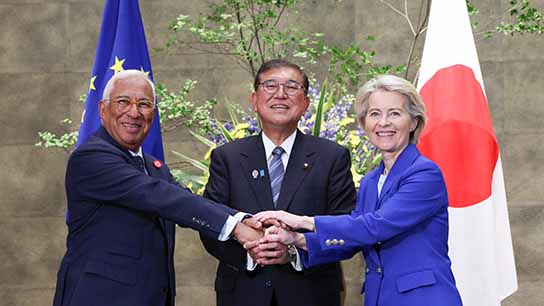ChatGPT said:
The European Union and Japan have announced a new strategic partnership designed to deepen economic cooperation, defend free trade, and enhance mutual security in the face of increasing global trade tensions and geopolitical uncertainty.
The announcement followed the EU–Japan Summit held in Tokyo, attended by European Commission President Ursula von der Leyen, European Council President António Costa, and Japanese Prime Minister Shigeru Ishiba. In a joint statement, the leaders confirmed the launch of a “competitiveness alliance” intended to strengthen bilateral collaboration across trade, innovation, energy, economic security, and defence.
Speaking to reporters after the meeting, von der Leyen said, “We will also work more closely together to counter economic coercion and to address unfair trade practices. We believe in global competitiveness and it should benefit everyone.” Her remarks come as the EU continues to face difficulty concluding a trade agreement with the United States and prepares for a round of complex engagements with Chinese officials.
The timing of the EU–Japan declaration follows closely on the heels of a separate agreement between Tokyo and Washington, under which the United States has reduced import tariffs on Japanese automobiles from 25% to 15%. In return, Japan has pledged increased investment and financial commitments in the American market. The EU, by contrast, has taken the opportunity to reinforce its economic alignment with Japan on the basis of shared values and long-term strategic objectives.
Prime Minister Ishiba emphasised the importance of maintaining a rules-based international trading framework. “We will work together to uphold and strengthen a rules-based, free and fair economic order,” he said. The leaders also reaffirmed their commitment to the multilateral trading system with the World Trade Organization at its core.
In addition to trade and economic cooperation, the summit also marked a shift towards closer defence and security collaboration. According to Ishiba, both sides have agreed to initiate a dialogue focused on defence industry cooperation and to commence formal negotiations on a bilateral information security agreement.
“In the field of security, we agreed to cooperate to launch a defence industry dialogue to strengthen the defence industrial base, which is a priority for both sides,” he stated. “We will also begin official negotiations on a Japan–EU information security agreement.”
The competitiveness alliance represents a continuation of closer EU–Japan relations following the 2019 Economic Partnership Agreement. However, this new initiative expands the focus to include resilience in critical supply chains, joint work on advanced technologies, and strategic coordination on external threats, particularly those stemming from economic and political coercion.
Both Brussels and Tokyo have expressed growing concern over the use of economic tools as instruments of political leverage by third parties, widely understood to refer to China’s trade practices and the United States’ increasing resort to protectionist measures under the administration of President Donald Trump.
The EU’s recent difficulties in negotiating a sustainable trade framework with Washington have prompted European officials to seek greater alignment with like-minded partners in the Indo-Pacific region. Japan, as the world’s third-largest economy and a longstanding advocate of multilateralism, occupies a pivotal position in the EU’s wider regional strategy.
For the EU, the move also fits within its broader agenda of pursuing “open strategic autonomy” – a policy that aims to diversify trade partnerships, reduce overdependence on single suppliers, and enhance economic sovereignty without resorting to isolationism.
The leaders did not disclose specific targets or timelines for the competitiveness alliance, but joint working groups on trade resilience, technological cooperation, and industrial security are expected to be established in the coming months.
The agreement also reflects broader geopolitical convergence between Europe and Japan in response to ongoing global instability. Russia’s continued aggression in Ukraine, armed conflicts in the Middle East, and Beijing’s military build-up in East and Southeast Asia have underscored the interconnected nature of security concerns across both the European and Indo-Pacific theatres.
As the summit concluded, both von der Leyen and Ishiba reiterated the need for coordinated responses to these challenges. The alliance, they said, will serve not only as an instrument for economic cooperation but also as a platform for reinforcing democratic principles and international legal norms.
The formal launch of negotiations on an information security agreement is expected later this year. The agreement, once concluded, will provide a legal and procedural framework for the secure exchange of sensitive information between European and Japanese governmental and industrial entities.
In an increasingly fragmented international environment, the EU–Japan alliance signals a deliberate move towards reinforced partnerships based on shared values, mutual interests, and collective resilience.


